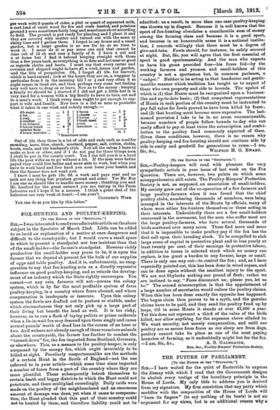FOX-HUNTING AND POULTRY-KEEPING.
[To THE EDITOP. OT TIIE "SPECTATOR...I SIR,—I was interested toreadyouradmirable article on theabove siubject in the Spectator of March 22nd. Little can be added to so lucid an explanation of a matter at once dangerous and difficult to the countryside; but I would crave a small space in which to present a standpoint not less insistent than that of the small-holder—the farmer's standpoint. However richly productive the small-bolder may prove to be, it is upon the farmer that we depend it present for -the bulk of our supplies of eggs and table poultry. And it is, unfortunately, no exag- geration to say that fox-hunting acts as a directly repressive Influence on good poultry-keeping, and so retards the develop- ment of an industry which the State rightly encourages. You cannot—at any rate, farmers will not—pursue the colony system, which is by far the most profitable system of farm poultry-keeping, in a country where foxes abound, and where compensation is inadequate or insecure. Upon this colony system the fowls are drafted out to pasture or stubble, under which circumstances they not only pick up a large part of their living but benefit the land as well. It is too risky, however, so to run a flock of laying pullets or prime cockerels when a lie-in-wait fox may descend upon them singly and cause several pounds' worth of dead loss in the course of an hour or two. As if we have not already enough of these voracious animals about the countryside, the farmer has further to combat the 4‘ turned-down" fox, the fox imported front Scotland, Germany, or elsewhere. This, as a menace to the poultry-keeper, is only surpassed by the mangy fox, which ought invariably to be killed at sight. Peculiarly unsportsmanlike are the methods of a certain Hunt in the South of England—not the one referred to in your article—which some time since imported a number of foxes from a part of the country where they are more plentiful. These subsequently betook themselves to certain heath and boggy districts to which the Hunt could not penetrate, and there multiplied exceedingly. Daily raids were made on the poultry of the neighbourhood and an enormous amount of damage was done, yet when it came to compensa- tion, the Hunt pleaded that this part of their country could not be hunted by them, and therefore liability could not be admitted: as a result, in more than one case poultry-keeping was thrown up hi disgust. Because it is well known that the sport of fox-hunting circulates a considerable sum of money among the farming class and because it is a good sport, and because in an honourable sense it is a national institu- tion, 1 concede willingly that there must be a degree of give-and-take. Fowls should, for instance, he safely secured at night. But, Sir, you will agree that the first essential of sport is good sportsmanship. And the man who expects to have his game provided free—his foxes fed—by the working farmers and yeomen and small-holders of this country is not a sportsman but, in common parlance, a "cadger." Neither is he acting in that handsome and gentle- manlike manner which tradition has taught us to expect of those who own property and ride to hounds. The upshot of which is (I) that Hunts must be reorganized upon a business- like and up-to-date basis ; (2) that competent representatives of Hunts in each portion of the country -must be instructed to pay full value for fowls proved to have been killed by foxes ; and (3) that hunting must become more expensive. The last- named provision I take to be in no sense unconscionable, because numbers of people follow hounds to-day who can easily afford to pay at least twice the subscription and contri- bution to the poultry fund commonly expected of them. Given these conditions, however, there is no reason why poultry-keeping and fox-bunting should not continue side by side in amity and goodwill for generations to come.—I am,










































 Previous page
Previous page